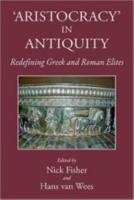
The Classical Press of Wales (2015) 390pp £68 (ISBN 9781910589014)
Fisher (F.) and van Wees have made major contributions to our understanding of values and status in Greek history. In the opening essay of this volume—their third joint editorial enterprise—they provide a formidably rich discussion of the shortcomings of applying the notion of ‘aristocracy’ to the Greek and Roman world. As they persuasively demonstrate, the category of an elite determined by birth that is also in control of most land resources may carry some explanatory power for the early modern world, but has no relevance whatsoever to most of what goes on in Greek or Roman history: closed elites are very much the exception, and one that is always in need for further qualification. If one is to overcome the notion of aristocracy, important consequences follow for the appreciation of political and social inequality, and in turn of other oft-debated issues such as the weight of free waged labour and slavery. More generally, further work is needed on familiar concepts: the categories of class and status group require careful attention, and both may be applicable to specific historical contexts. This opening essay is a major contribution, essential reading for anyone with even a tangential interest in ancient social history. Historians of later periods will also use it with great profit, not least because of what it will tell them about the concepts that they too routinely work with—and on.
The remaining ten essays shed light on a range of important problems. A further merit of the volume is to make available in English papers by some of the most original French scholars currently at work on archaic and classical Greek history. Alain Duplouy makes a powerful case for the link between status and performance in ancient Greece, hence adding a further level of objections to the notion of aristocracy by birth, and charting the role that geneaological structures played in enabling social mobility. It is striking to see, at the end of an otherwise very sophisticated essay, a return to the Nietzschean construction of the agonistic mentality of ‘the Greeks’. Antoine Pierrot deals with the Eupatrids at Athens and argues that an hereditary elite in control of cults and based on cooptation did exist before being effectively dismantled by Solon. While not being a pattern that may be deemed the rule across the Greek world, arguing for the existence of this social group is preferable to envisaging the existence of an invented tradition. Olivier Mariaud deals with archaic Samos and the burial and self-representation strategies of its elite, where he identifies several traditions of aristocracy of birth, the main example of which is represented by the splendid material from the so-called tumulus of Megas.
Other papers develop more discernibly the insights and prompts set out in the introduction. F. gives a sample of the implications of his methodological premises in a case-study on Aegina, which also involves reconsidering some familiar texts of Pindar. Stephen Lambert puts to the test the Athenian genē, and shows that understanding them through aristocratic lenses as enablers of access to power is fundamentally inadequate for the classical period (different dynamics set in after the coming of Rome). That does not amount, though, to denying the political significance of genē as factors that conferred and confirmed status on individuals and played a role in determining and policing access to priesthoods. Noburu Sato explores the role that connections with foreign elites played in Athenian diplomacy (an issue that has received a comprehensive investigation in William Mack’s recent book on proxeny). Understanding those connections as fundamentally hereditary or aristocratic, however, would entail losing sight of their fluidity and precariousness. James Whitley discusses the elites in Archaic Crete, which he proposes to regard as exceptionally closed and ‘aristocratic’, and less dynamic than is the case in the rest of the Greek world. Thomas Figueira and Gillian Shepherd turn to colonial contexts, respectively with a study of dynamics of elite formation in the Archaic period and with the dynamics of wealth creation and accumulation (with a strong material culture emphasis) in Sicily.
Rome receives comparatively less attention in this volume, perhaps because ‘aristocracy’ is a term that many Roman historians have already been using with considerable scepticism over the last few decades. Its place is by no means marginal, though. Guy Bradley has a major discussion of how the notion of aristocracy should be understood in the context of early Rome, not just against the background of the ‘Struggle of the Orders’, but especially in the wider context of elite formation and consolidation in Central Italy. The concept proves as unfruitful here as it does in most of the Greek world: mobility and fluidity are the key notions to the understanding of a process of elite formation that is both hierarchical and unstable. Laurens Tacoma has a useful overview of the problems entailed by elite mobility in the principate, where the relevance of aristocracy is put under even greater stress: in the absence of hereditary status, closed order, and even a distinctive order, it is best left out of account altogether.
This is a collection of essays with a strong, and indeed compelling, message, even though not all the voices in it make the same case, or produce it with the same degree of assertiveness or cogency. It is, first and foremost, a very important history book in the fullest sense of the term: one that tackles a major problem and effectively guides its reader through a thoughtful assessment of it. It deserves a wide and attentive audience, and has the potential to make a very significant impact on the way ancient history is taught, not just at university level.
FEDERICO SANTANGELO—Newcastle University
